Related Research Articles
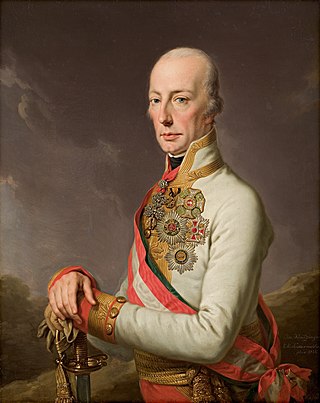
Francis II and I was the last Holy Roman Emperor as Francis II from 1792 to 1806, and the first Emperor of Austria as Francis I from 1804 to 1835. He was also King of Hungary, Croatia and Bohemia, and served as the first president of the German Confederation following its establishment in 1815.

János Batsányi was a Hungarian poet.

Leopold II was Holy Roman Emperor, King of Hungary, Croatia and Bohemia, and Archduke of Austria from 1790 to 1792, and Grand Duke of Tuscany from 1765 to 1790. He was a son of Empress Maria Theresa and Emperor Francis I, and the brother of Queen Marie Antoinette of France, Queen Maria Carolina of Naples, Duchess Maria Amalia of Parma, and Emperor Joseph II. Leopold was a moderate proponent of enlightened absolutism. He granted the Academy of Georgofili his protection. Unusually for his time, he opposed the death penalty and torture and abolished it in Tuscany on 30 November 1786 during his rule there, making it the first nation in modern history to do so. This act has been commemorated since 2000 by a regional custom known as the Feast of Tuscany, held every 30 November. Despite his brief reign, he is highly regarded. The historian Paul W. Schroeder called him "one of the most shrewd and sensible monarchs ever to wear a crown".
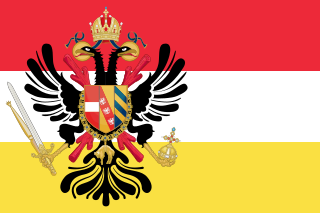
The Austrian Netherlands was the territory of the Burgundian Circle of the Holy Roman Empire between 1714 and 1797. The period began with the Austrian acquisition of the former Spanish Netherlands under the Treaty of Rastatt in 1714 and lasted until Revolutionary France annexed the territory during the aftermath of the Battle of Sprimont in 1794 and the Peace of Basel in 1795. Austria relinquished its claim on the province in 1797 by the Treaty of Campo Formio.

Ferenc Kazinczy was a Hungarian author, poet, translator, neologist, an agent in the regeneration of the Hungarian language and literature at the turn of the 19th century. Today his name is connected with the extensive Language Reform of the 19th century, when thousands of words were coined or revived, enabling the Hungarian language to keep up with scientific progress and become an official language of the nation in 1844. For his linguistic and literary works he is regarded as one of the cultural founders of the Hungarian Reform Era along with Dávid Baróti Szabó, Ferenc Verseghy, György Bessenyei, Mátyás Rát and János Kis.

Ignaz Edler von Born, also known as Ignatius von Born, was a mineralogist and metallurgist. He was a prominent freemason, being head of Vienna's lodge and an influential anti-clerical writer. He was the leading scientist in the Holy Roman Empire during the 1770s in the age of Enlightenment.

The Kingdom of Hungary between 1526 and 1867 existed as a state outside the Holy Roman Empire, but part of the lands of the Habsburg monarchy that became the Austrian Empire in 1804. After the Battle of Mohács in 1526, the country was ruled by two crowned kings. Initially, the exact territory under Habsburg rule was disputed because both rulers claimed the whole kingdom. This unsettled period lasted until 1570 when John Sigismund Zápolya abdicated as King of Hungary in Emperor Maximilian II's favor.
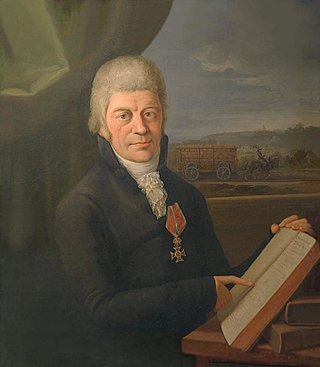
Franz Josef Gerstner was a German-Bohemian physicist, astronomer and engineer.

Maria Christina, Duchess of Teschen, was the fifth child of Maria Theresa of Austria and Francis I, Holy Roman Emperor. Married in 1766 to Prince Albert of Saxony, the couple received the Duchy of Teschen, and she was appointed Governor of the Austrian Netherlands jointly with her husband during 1781–1789 and 1791–1792. After two expulsions from the Netherlands, she lived with her husband in Vienna until her death.

The Herzgruft is a burial chamber that protects 54 urns containing the hearts of members of the House of Habsburg. The crypt is located behind the Loreto Chapel in the Augustinian Church within the Hofburg Palace complex in Vienna, Austria.

The Ducal Crypt is a burial chamber beneath the chancel of Stephansdom in Vienna, Austria. It holds 78 containers with the bodies, hearts, or viscera of 72 members of the House of Habsburg.
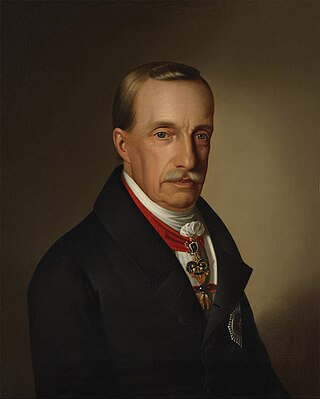
Archduke Joseph Anton of Austria was the 103rd and penultimate palatine of Hungary who served for more than fifty years from 1796 to 1847, after he had been appointed governor in 1795.

Andreas Joseph Hofmann was a German philosopher and revolutionary active in the Republic of Mainz. As Chairman of the Rhenish-German National Convention, the earliest parliament in Germany based on the principle of popular sovereignty, he proclaimed the first republican state in Germany, the Rhenish-German Free State, on 18 March 1793. A strong supporter of the French Revolution, he argued for an accession of all German territory west of the Rhine to France and served in the administration of the department Mont-Tonnerre under the French Directory and the French Consulate.

Archduke Alexander Leopold of Austria was Palatine of Hungary, appointed during the reign of his father, Emperor Leopold II, and serving into the reign of his elder brother, Emperor Francis II.
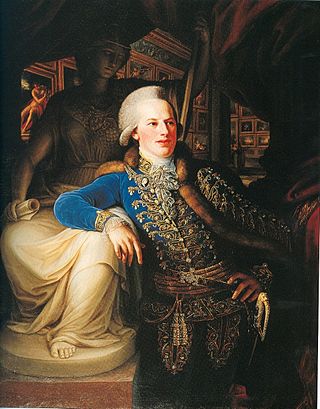
Ferenc József, 1st Prince Koháry de Csábrág et Szitnya, was a Hungarian magnate and statesman. He was a member of the noble House of Koháry and served as Hungarian Chancellor. On 15 November 1815, Emperor Francis I of Austria awarded him the title of Fürst von Koháry de Csábrág et Szitnya.

Count Ignác Gyulay de Marosnémeti et Nádaska, Ignácz Gyulay, Ignaz Gyulai was a Hungarian military officer, joined the army of the Habsburg monarchy, fought against Ottoman Turkey, and became a general officer during the French Revolutionary Wars. From 1806 he held the title of Ban of Croatia. In the struggle against the First French Empire during Napoleonic Wars, he commanded army corps. At the time of his death, he presided over the Hofkriegsrat, the Austrian Council of War.

Ignác Martinovics was a Hungarian scholar, chemist, philosopher, writer, secret agent, Freemason and a leader of the Hungarian Jacobin movement. He was condemned to death for high treason and beheaded on 20 May 1795, along with count Jakab Sigray, Ferenc Szentmarjay, József Hajnóczy and others. As the founder of the Hungarian Jacobin Clubs, he was considered an idealistic forerunner of great thought by some, and an unscrupulous adventurer by others.

Johann Anton Graf von Pergen was a diplomat and statesman of the Habsburg monarchy, serving under four consecutive monarchs for more than fifty years. He was one of the most influential individuals in the reformist administration of Joseph II (1780-1790).

Leopold Alois Hoffmann was an Austrian writer and dramatist. He was based for most of his career in Vienna.

Otto Heinrich von Gemmingen zu Hornberg was a member of the aristocratic Gemmingen family. He was a diplomat and enlightenment writer, a Freemason and a friend of the composer Wolfgang Amadeus Mozart.
References
- 1 2 3 "Franz Gotthardi ..." Ueber die Verurtheilung einiger Staats-Verbrecher. Weimar Verlag & Niedersächsische Staats- und Universitätsbibliothek Göttingen. 12 March 1795. pp. 7–8. Retrieved 8 August 2020.
- 1 2 "Gotthardi Ferenc". ADT . Retrieved 8 August 2020.
- 1 2 Constantin von Wurzbach (January 1863). "Hoffmann, Leopold Alois". Biographisches Lexikon des Kaisertums Österreich (austrian literature online). pp. 161–164. Retrieved 8 August 2020.
- 1 2 3 4 5 6 Klaus Epstein (8 March 2015). The challenge of the French Revolution. Princeton University Press. p. 477. ISBN 978-1-4008-6823-0.
{{cite book}}:|work=ignored (help) - ↑ Eva Gesine Baur (31 May 2012). Wien 1792-1795: Hass und Verfolgen. C.H.Beck. p. 252. ISBN 978-3-406-63087-3.
{{cite book}}:|work=ignored (help) - 1 2 3 4 5 Lucian Maximilian Röthlisberger (October 2010). "Verfassungsdiskussionen in der Habsburgermonarchiezur Zeit der Französischen Revolution Ablauf und Ideen" (PDF). (A 083 101). Universität Wien. Retrieved 8 August 2020.
- 1 2 Réka Lengyel; Gábor Tüskés (26 November 2017). Ignác Martinovics: Report about his acceptance to the Vienna Illuminati Lodge (1792). Lengyel Réka. p. 222. ISBN 978-963-416-090-8.
{{cite book}}:|work=ignored (help) - ↑ Tomasz Kamusella: The Politics of Language and Nationalism in Modern Central Europe, Publisher: Palgrave Macmillan, 2009, ISBN 9780230550704
- ↑ Helmut Reinalte (1990). "Martinovics, Ignaz Joseph (Ignác József) ... Jakobiner, * 22.7.1755 Pest, † 20.5.1795 Buda. (katholisch)". Neue Deutsche Biographie . Historische Kommission bei der Bayerischen Akademie der Wissenschaften (HiKo), München. p. 307. Retrieved 9 August 2020.